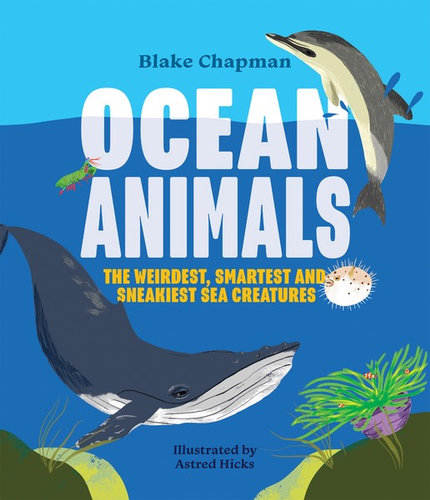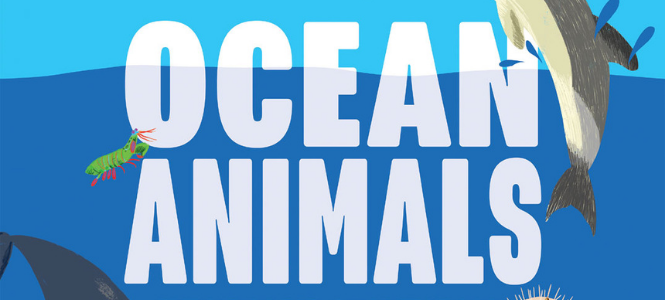Blake Chapman has a PhD in marine science, with a focus on shark development and neuroscience. She has worked hands-on with a wide range of aquatic animals and has a passion for promoting conservation through education. Most of all, she loves all things wonderful, wacky and wild! Blake’s first book, Shark Attacks: Myths, Misunderstandings and Human Fear, was published in 2017 by CSIRO Publishing and her latest book is Ocean Animals: The Weirdest, Smartest and Sneakiest Sea Creatures. She is also the Sharks Editor-at-Large for Australian Geographic.
Today, Blake Chapman is on the blog to answer our Ten Terrifying Questions. Read on!
1. To begin with why don’t you tell us a little bit about yourself – where were you born? Raised? Schooled?
I was born and raised in the small state of Maryland in the United States. But not many people have heard of Maryland, so I usually say that I grew up just outside of Washington DC, which is the capital of the US and where the President lives! We moved just before I started Year 7 to a location close to the Chesapeake Bay. I loved this, because it meant I lived closer to the water. I did my undergraduate university degree in Biology at James Madison University in the US, then moved to Australia when I was 21 to do my postgraduate studies (Honours and PhD) at The University of Queensland. I’ve lived in southeast Queensland ever since!
2. What did you want to be when you were twelve, eighteen and thirty? And why?
My earliest career goal was to be a princess. Thankfully, I quickly moved past that, although my ambition remained high. By twelve, I desperately wanted to be an Olympic swimmer. While I was a good swimmer at the local level, I quickly realised that the Olympics was a bit out of my reach. At eighteen, I was on a mission to be a shark researcher. I wanted to understanding these animals better, because surely there was more to them than what was presented on Shark Week!
At thirty(-something), I’m still a massive science nerd, but instead of doing the heavy investigative work, I now focus on science communication. This means I talk to, and find interesting other ways of communicating with lots of people to help them to better understand sharks – and many other complex science topics – more easily and clearly. I am also very happy to also hold the roles of wife and mum.
3. What strongly held belief did you have when you were younger that you do not have now?
That I knew everything. Despite my parents better constant counter-arguments, I was absolutely convinced of it! Now, knowing better, I am so glad I don’t know everything – the world is far more interesting and exciting this way!
4. What are three works of art – book or painting or piece of music, etc – that you can now say had a great effect on you and influenced your own development as a writer?
The movie Jaws: it helped me to understand what can cause people to feel fear. Knowing why people fear things is really important in helping to relieve some of that fear.
Bill Bryson’s book, A Short History of Nearly Everything: this is a great piece of ‘science communication’. It made very heavy and complex (and in some cases, boring to me) concepts clear, interesting and engaging.
The numerous kids’ book that present false information and instead just conform to stereotypes and sensationalised topics: these motivated me to do what I could to ensure there were better options and resources for kids to learn from that could be just as engaging and fun. The truth can be extraordinary, and oftentimes, fact is more incredible than fiction.
5. What made you choose to write a children’s book?
There are so many weird and wonderful and crazy and lovable features of ocean animals, yet these animals are generally inaccessible to us – hidden below the waves! So, they often go unrecognised and underappreciated. I wanted to bring some of these facts to the surface, providing kids with an accessible way to start learning about them. My hope is that the window the book provides into the ocean realm will pique a lifetime of interest and exploration into these animals.
I wholeheartedly believe that kids today will be the ones to turn our planet around. We, and our past generations, have set so many challenges for them, but I believe they are up to it! Marine animals are incredibly important, and the ecosystems they support are absolutely critical to the health of our planet. We conserve the things we love, and the best time to develop a keen interest and love of things is when you are young.
6. Please tell us about your latest book!
Ocean Animals is an exploration of the incredible occupants of the marine world. The book focuses on themes that would be familiar to kids, and in many cases relatable to their own lives. This includes the concepts of size, speed, relationships, intelligence – and of course, how to find food! Each chapter discusses a few specific animals that demonstrate these themes to an extent that few others could. The book was designed to include some familiar, fan-favourite animals, like dolphins, sharks and clownfish, but also some that you are unlikely to have ever heard of before, like salps, sea lampreys, flower urchins and sea hares. The book includes ‘sea-lebrity’ animal profiles, amazing photographs and illustrations and ways that kid’s can become citizen scientists and help protect the oceans starting right now. Although it’s written to entertain and engage (and surprise and gross-out) young audiences, all of the information comes from leading scientific research.
7. What do you hope kids will take away with them after reading your book?
Mostly, I hope kids have fun with the information in the book and learn something new. But hopefully, simultaneously, they also gain a better understanding of how incredible and diverse ocean animals are; that these animals are worth learning more about – and that there is so much more to learn; and that these animals are so, so important, but they need our help (fortunately, every single one of us – no matter how big or small, old or young – can make a difference)!
8. Who do you most admire in the realm of writing and why?
I am in awe of people who can write something that truly touches someone and changes their life forever – even if it’s only one person. I am also thoroughly impressed by people who can write things that make me laugh out loud.
9. Many artists set themselves very ambitious goals. What are yours?
To be the person who changes someone’s life! Or, to write something that strongly influences policy/decision-making towards improved management of our natural resources and environments. However, I’d also settle for being the person who makes someone laugh.
10. What advice do you have for aspiring writers?
Be curious and allow yourself to be inspired! Curiosity leads to the desire for deeper understanding and inspiration is a great driver of creativity. Then, back yourself! This can be hard sometimes, but it’s super important and well worth the effort.
Thank you for playing!
—Ocean Animals by Blake Chapman & illustrated by Astred Hicks (CSIRO Publishing) is out now.

Ocean Animals
The Weirdest, Smartest and Sneakiest Sea Creatures
Ocean animals are truly awesome. They come in every size, colour and shape imaginable. They are also some of the weirdest, sneakiest and smartest animals on the planet!
This book focusses on the features and skills that make these creatures extra-incredible. You will discover animals that are masters of defence and others that use high speeds to eat...







Comments
No comments